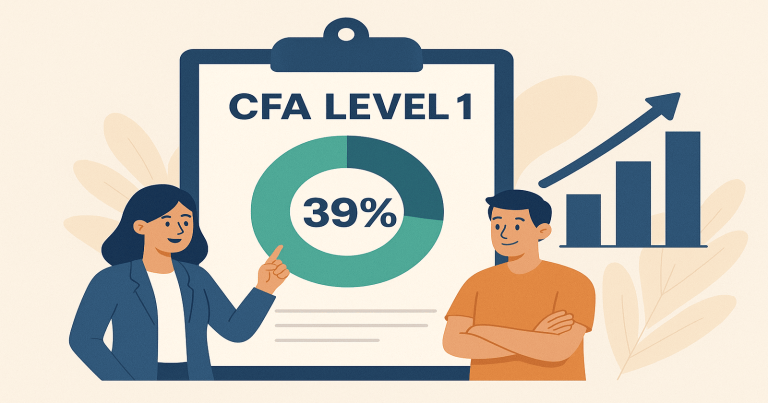Many students preparing for the CFA exam often ask about the CFA Level 1 pass rate. This number shows how many students cleared the Level 1 CFA exam in a particular attempt. It also tells you how hard the exam is and how well students perform. The CFA Level 1 pass rate helps future candidates set their expectations and prepare better.
In recent years, the CFA Level 1 pass rate has gone up and down. During the COVID years, the pass rate dropped to historic lows. However, over time, with changes in the exam structure, student habits, and learning platforms, the pass rate has shown improvement. As of 2024 and early 2025, the CFA Level 1 pass rate remains close to 40-45% globally. This means out of every 100 students who appear for the exam, around 40 to 45 pass.
What Does the CFA Level 1 Pass Rate Mean?
The CFA Level 1 pass rate is the percentage of students who pass the Level 1 exam out of the total number of candidates who appeared. The CFA Institute calculates this percentage after every exam window. This data is then published on their official website and helps future candidates understand the difficulty level and competition.
Understanding Pass Rate in Simple Terms
For example, if 50,000 students appeared for the exam and 22,000 passed, the pass rate would be 44%. This tells you that less than half of the students cleared the exam. The CFA exam is not like regular college exams, which 80% of students pass. It is known for being tough and global.
The pass rate is not only about hard questions. It also reflects how well-prepared students were. The CFA Institute sets a Minimum Passing Score (MPS), which is the score a candidate needs to pass. The exact MPS is not made public, but experts say it is usually around 65-70%.
The pass rate helps students set their goals and plan how many hours to study. The CFA Institute suggests at least 300 hours of study for each level. Those who follow a plan, revise often, and practice mock tests usually have a better chance of crossing the MPS and increasing their chances of passing.
CFA Level 1 Pass Rate — Year-wise Trends
To understand the CFA Level 1 exam better, you should look at past pass rates. These numbers show how the pass rate has changed over the years and give a clear picture of what to expect.
| Exam Year | Pass Rate (%) | Key Observation |
| 2018 | 43% | Stable and average performance year |
| 2019 | 41% | Slight dip due to syllabus expansion |
| 2020 | 49% | Higher due to fewer test-takers (COVID impact) |
| 2021 (Feb) | 44% | First CBT-based exam: format change effect |
| 2021 (May) | 25% | All-time low during pandemic disruption |
| 2022 (Avg.) | 37% | Slight recovery as system stabilizes |
| 2023 (Avg.) | 39% | Return to pre-pandemic averages |
| 2024 (Avg.) | 42% | Rise due to better prep tools and coaching |
| 2025 (Jan-Feb) | 45% (Estimated) | Consistent with trend of better prep methods |
Insights from Trends
From the above data, you can see that the CFA Level 1 pass rate often stays between 40% to 45%. During 2021, the pass rate fell to an all-time low of 25%, which shocked many students. This happened mainly due to pandemic-related issues like postponed exams, short prep time, and less access to coaching or books.
Since 2022, students have started adapting to online learning, flexible CBT (computer-based testing), and self-paced study plans. This has helped push the pass rate back up to near-normal levels. As of 2025, the CFA Institute has kept the exam structure consistent, which is helping more students prepare well and pass.
Factors That Affect CFA Level 1 Pass Rate
Several reasons influence the CFA Level 1 pass rate. Some are within the student’s control, while others depend on external factors like exam changes, test windows, or academic support.
Preparation Time and Planning
One of the most significant factors is how much time students give to study. The CFA Institute recommends at least 300 hours of preparation. Many successful candidates report spending 350 to 400 hours, including mock exams. Students who plan early and follow a consistent schedule perform better.
If a candidate studies for only one or two months, the chances of clearing the exam drop. Cramming doesn’t work for CFA. You need time to understand the concepts, revise, and practice questions.
Coaching and Study Materials
Another factor is the use of proper study tools. Many students now use platforms like Kaplan Schweser, Plutus Academy, FinTree, and CFA Institute’s Learning Ecosystem. These provide updated books, video lectures, practice quizzes, and doubt-solving. Better tools mean better understanding and better performance.
Some students still rely only on PDF notes or outdated CFA books. This affects performance badly because the CFA syllabus changes often. Always use current-year material for your preparation.
Mock Tests and Practice
Practice is key to passing CFA Level 1. Those who solve at least 4 to 6 mock tests usually do better in the final exam. Mock exams help you manage time, reduce exam fear, and improve accuracy.
Students who ignore mocks and only read books often struggle with time management during the real exam. The CFA exam has 180 questions to be solved in 4.5 hours. Without practice, many students run out of time or get confused.
Stress and Exam Conditions
Mental health, exam anxiety, and exam-day surprises also affect the pass rate. During 2021, pass rates fell because many students faced stress due to multiple reschedules. Test centre problems, internet issues during online exams, and fear of COVID made things worse.
Now, with stable CBT patterns and smooth scheduling, pass rates have improved. Still, students should do mental preparation along with academic study. Stay calm, sleep well before the exam, and practice under real conditions.
How to Improve Your CFA Level 1 Passing Chances?
While the CFA Level 1 pass rate may look low, you can improve your chances by following the proper methods. Here are some strategies that actually work.
Follow a Proper Study Plan
Start your preparation at least six months before the exam date. Divide topics week-wise. Spend extra time on Ethics, FRA, and Quantitative Methods, as these are scoring but tricky sections. Set weekly goals and revise regularly.
Use the 80-20 rule. Spend 80% of your time on primary readings and 20% on revision. Keep 4 weeks before the exam only for mocks and formula revision.
Choose Right Coaching or Self-Study Platform
Join CFA coaching only if you struggle to study alone. Plutus Education, EduPristine, and Fintree are some of the best CFA coachings in India. They provide live classes, recorded lectures, and topic-wise questions.
If you choose self-study, use official CFA books, Kaplan Schweser notes, or FinShiksha modules. Please avoid using free or pirated content, as it may be outdated and confusing.
Practice More, Guess Less
Always solve topic-wise questions after completing each reading. Take full-length mock exams under timed conditions. Analyze your weak areas. Do not skip ethics mock questions, as this section can be a tie-breaker if your score is close to the passing mark.
Focus on accuracy. Don’t guess too much in the actual exam. CFA penalizes careless mistakes, and guessing unthinkingly won’t help.
Common Myths About CFA Level 1 Pass Rate
There are many wrong beliefs among students regarding pass rates and preparation. Let’s break these myths and give you the truth.
Myth 1: “Only toppers can pass CFA.”
That’s not true. CFA is challenging but not impossible. Many average students have passed CFA Level 1 by following a disciplined plan. Hard work matters more than your past academic record. Even unaccompanied students have cleared it.
Myth 2: “CFA Level 1 pass rate is fixed at 40%”
The CFA Institute does not fix any pass rate. It only sets the minimum passing score based on difficulty and expert judgment. The final pass rate depends on how well students perform. It can be 25% or even 50%, depending on the attempt.
Myth 3: “You can pass CFA Level 1 by studying for 1 month.”
Sporadic cases exist, but most students need 4 to 6 months. The syllabus is vast, and questions are application-based. Without complete prep, the chances of passing are low. Shortcuts don’t work in CFA exams.
CFA Level 1 Pass Rate FAQs
1. What is the current CFA Level 1 pass rate?
The CFA Level 1 pass rate for the most recent exam sessions in 2024 and early 2025 is around 42% to 45%. This means that out of every 100 students, about 42 to 45 pass the exam. The pass rate can change every year depending on student preparation and exam difficulty.
2. Why did the CFA Level 1 pass rate drop in 2021?
The pass rate dropped in 2021 to as low as 25% because of the COVID-19 pandemic. Many students faced delays and stress and lacked proper study time. Coaching centres were closed. exams were postponed, and preparation was disturbed. This caused a low pass rate in that year.
3. What is a good score to pass CFA Level 1?
The CFA Institute does not share the exact passing score. But experts say you should aim to score at least 65% to 70% overall. Some topics, like ethics, are more critical and can determine your final result if your total score is close to the minimum passing score (MPS).
4. How many hours should I study to pass CFA Level 1?
You should study at least 300 hours to prepare well for CFA Level 1. Many students study around 350–400 hours, including time for practice tests. Make a study plan for 5–6 months and revise regularly. Daily practice and mock exams help you stay on track.
5. Does CFA Level 1 coaching improve your pass chances?
Yes, coaching can help you understand concepts better, stay disciplined, and solve more practice questions. Many students join coaching from places like Plutus Academy, Fintree, and EduPristine. However, even self-study can work if you use updated books and stick to a clear study plan.
6. Is the pass rate different for online and offline exams?
No, the pass rate is based on performance, not on exam format. Whether you take the CFA Level 1 exam online or at a test centre, the marking is the same. However, your comfort and environment can affect your performance on exam day.


